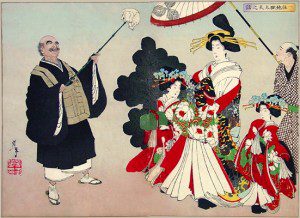Yesterday Jiryu Mark Rutschman-Byler, who with his brother Hondo Dave Rutschman, maintains the wonderful blog No Zen in the West posted a reflection on bias that I commend to anyone interested in the questions associated with the spiritual life, meaning, purpose, direction. That stuff.
Jiryu takes a head on run at a pretty common Zen trope “seeing things as they are.” It is a rare Zen teacher who avoids it. Certainly it is part of my bag of tricks. Jiryu makes a flat out statement, no, no. No such thing.
He briefly draws on the classical Buddhist understanding of the mind, and particularly the manas, the thinking function. As Jiryu points out “This deep mind, always hidden, functions constantly to divide. Diligently and patiently, carefully and thoroughly, without missing a beat or even a sliver of opportunity, it divides me and you, subject and object, grasper and grasped. All day and all night, manas cuts. By the time we are conscious of “a world,” or even a moment of color, a sound, a flash – that world is already divided.”
So, unless someone has attainted to the fullness of Buddhahood, and by that he means as defined as having cleared all hint of dust and clinging, it just isn’t possible to see anything clearly. We are all, to cite another religious tradition, “seeing through a glass darkly.”
The psychotherapist and Zen teacher Barry Magid concurs. “Yes – as they are is ‘as they are as seen by me here and now’ – there is no view from nowhere, no view from ‘nobody’ no God’s eye view. We cannot eliminate subjectivity only acknowledge it.” After calling us to some common sense about this, Jiryu basically calls us to a little humility. Not a bad thing. Actually, when confronting the great matter, anything else is something past foolish. I think he speaks truth.
And, not but, not however, and, as I read his article, what it triggered for me was a koan. In the Harada Yasutani koan curriculum it usually goes, “Why are perfectly realized saints and bodhisattvas attached to the vermillion thread?” Another phrasing, and how I tend to prefer to present it, goes “Songyuan asked, ‘Why can’t clear-eyed Bodhisattvas sever the red thread?’”
I’ve also seen a longer form presentation which unpacks the question a bit for us. “Master Songyuan addressed the assembly and said, ‘In order to realize the Way with perfect clarity, there is one essential point you must penetrate and not avoid: the red thread of passions that cannot be severed. Few really face this problem, and it is not at all easy to settle. Face it directly without hesitation, for how else can liberation come?’”
Songyuan Chongyue, who lived through much of the twelfth century and almost a decade into the thirteenth, liked to rub our noses in things. In the Wumenguan collection, the Gateless Gate, he is recorded asking “Why is it that a person of great strength cannot lift her leg?” Perhaps we can see how it is that he would be a direct lineage ancestor to Hakuin Ekaku.
Now the red thread, or the vermillion thread, is the current of blood, the tie of generations. It is about the messiness of life, and about life itself. Most commentaries on it dwell more on the fact it is one of only two cases in the vast koan literature to dwell in any degree, even implicitly with sexuality. And, that’s a worthy point.
But, there’s something else here, as well. I find it something directly relevant to Jiryu’s reflection. It points us to our conditioned existences, the fact we are composed of multiplicity of events coming together in a great shuffle of the deck into a moment. And in the next moment there’s a new shuffling of the deck and something new occurs. It’s all unstable. And, even more important, that fragile moment is itself insubstantial. Not so much a noun as a verb. We can call it a moment.
And within that moment there is little more than uncertainty. Uncertainty is the nature of that “what is” we’re being called to notice. Humility rises within this realization as naturally as an exhalation follows and inhalation.
And. There’s another Zen trope. See the tail and know the snake. That is the whole is known, and can only be known in the particular, in any given particular, dark glass, conditioned reality, slicing and dicing mind, passing moment.
So, that moment we find as we attend is it. Yes, it is mediated and incomplete. But, there is nothing that is not mediated. Nothing is complete. That is the it we find. And in addition to the things we are, our words, and our ideas fall into the same place. None are true. But, also, none are false.
We are called by our way into noticing, then noticing, then noticing.
We present ourselves and the universe presents. It turns out the slicing and dicing mind is itself it. Like every other blessed moment. That little corner of it which is like through a glass darkly, that little corner of it which is like an unexpected gift from an unknown source.
And that’s a really important point here. Nothing is earned. We don’t analyze our way to it. It comes more like a gift. It comes to us. Like a child’s kiss. Like grace. Someone in fact called it amazing grace. Works for me.
To encounter this moment should birth humility.
And, along with that, gratitude.
Of course humility. Of course gratitude. To add just one more line from the Zen tradition. Even the Buddha is still practicing. Gratefully. Humbly.
That’s the just this we need to see.













